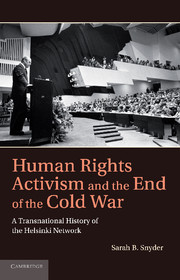Book contents
- Frontmatter
- Contents
- Acknowledgments
- Introduction
- 1 Bridging the East–West Divide
- 2 “A Sort of Lifeline”
- 3 Even in a Yakutian Village
- 4 Follow-up at Belgrade
- 5 Helsinki Watch, the IHF, and the Transnational Campaign for Human Rights in Eastern Europe
- 6 Human Rights in East–West Diplomacy
- 7 “A Debate in the Fox Den About Raising Chickens”
- 8 “Perhaps Without You, Our Revolution Would Not Be”
- Conclusion
- Bibliography
- Index
- References
Introduction
Published online by Cambridge University Press: 01 June 2011
- Frontmatter
- Contents
- Acknowledgments
- Introduction
- 1 Bridging the East–West Divide
- 2 “A Sort of Lifeline”
- 3 Even in a Yakutian Village
- 4 Follow-up at Belgrade
- 5 Helsinki Watch, the IHF, and the Transnational Campaign for Human Rights in Eastern Europe
- 6 Human Rights in East–West Diplomacy
- 7 “A Debate in the Fox Den About Raising Chickens”
- 8 “Perhaps Without You, Our Revolution Would Not Be”
- Conclusion
- Bibliography
- Index
- References
Summary
The rapid demise of communism in Eastern Europe, the reunification of a long-divided Germany, and finally the disintegration of the Soviet Union stunned almost all observers. These three developments, all within a few years of each other, represent for many the end of the Cold War. Understanding how and why the Cold War concluded is one of the most pressing questions historians face today. Thus far, scholars have considered a range of factors in assessing the end of the Cold War, with the predominant explanations focusing on Soviet economic stagnation, the arms race, the influence of ideas, the power of personality, Eastern European agency, and overextension abroad. Historians generally have underestimated the role of human rights advocacy and the influence of the 1975 Helsinki Final Act, which was the culmination of three years of negotiations at the Conference on Security and Cooperation in Europe (CSCE) and contained principles to govern East–West interactions in Europe. The Helsinki Final Act, however, spurred the development of a transnational network that significantly contributed to the end of the Cold War.
Examining the end of the Cold War through the lens of the CSCE also suggests a less traditional endpoint to the half-century superpower rivalry – January 19, 1989. On that date, the CSCE Vienna Review Meeting ended, representing a substantive end to the divide that had previously characterized Europe and East–West relations.
- Type
- Chapter
- Information
- Human Rights Activism and the End of the Cold WarA Transnational History of the Helsinki Network, pp. 1 - 14Publisher: Cambridge University PressPrint publication year: 2011
References
- 4
- Cited by

